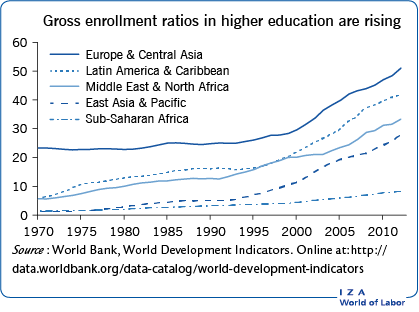Elevator pitch
As the number of secondary school graduates rises, many developing countries expand the supply of public and private universities or face pressure to do so. However, several factors point to the need for caution, including weak job markets, low-quality university programs, and job–education mismatches. More university graduates in this context could exacerbate unemployment, underemployment, and overeducation of professionals. Whether governments should regulate the quantity or quality of university programs, however, depends on the specific combination of factors in each country.

Key findings
Pros
Regulating the quantity and quality of university graduates might reduce the probability of overeducation and professional underemployment.
Preventing the unbridled growth of public and private universities could avoid waste of resources in low-return investments arising from information asymmetry about university quality.
Regulating university quantity and quality would provide students with the information on university quality and the employability of graduates needed for better decisions on long-term investments in human capital.
Cons
Limiting growth in the number of university students may constrain improvements in the human capital stock of the economy.
Limiting growth in the number of university students would reduce the economic and productivity growth potential of the economy.
Intervening in the higher education market could impede the upward economic and social mobility of younger members of the population.
Regulations affecting the quantity and quality of university graduates might be difficult to enforce in countries with weak institutional capacity.